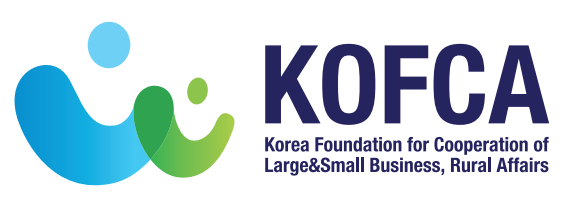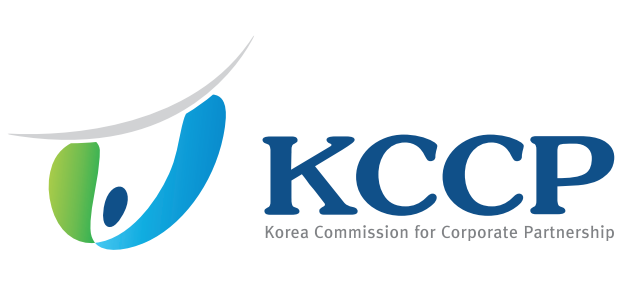Growth through
Cooperation between
Large Companies,
SMEs and Rural
Communities
WHO WE ARE
Our Purpose
- Korea Foundation for Cooperation of Large & Small Business, Rural Affairs (KOFCA) promotes mutual cooperation between large companies and SMEs, enhancing the competitiveness of both sectors and alleviating polarization. Furthermore, by fostering mutual cooperation between companies and rural agricultural communities, it contributes to the sustainable growth of our society.
- Korea Commission for Corporate Partnership (KCCP) aims to facilitate private sector agreements related to co-growth(win-win growth) between large companies and SMEs, as well as endeavoring to foster and spread a culture of co-growth(win-win growth).
What We Do

-
Manage and operate the fund for cooperation between large
companies and SMEs(Win-Win Cooperation Fund) as well as the
fund for cooperation with rural communities(Agricultural and Fishing
Villages Collaborative Cooperation Fund) -
Support the development and operation of cooperative programs
between large companies and SMEs -
Provide support for the protection of technology in SMEs and for
the fairization of procurement and subcontracting transactions -
Implement performance-sharing systems(Win-Win Model) and
joint expansions of large companies and SMEs, etc.-
Under the "Act on the Promotion of Mutually Beneficial Cooperation between
Large Enterprises and Small and Medium Enterprises(Win-Win Cooperation Act)"
-
Under the "Act on the Promotion of Mutually Beneficial Cooperation between

-
Assess and publish the win-win index and public institutions’ winwin
growth evaluation -
Reach an agreement on and publicly disclose suitable types of
businesses for SMEs, and recommend types of businesses that
support the livelihood of micro enterprises -
Mediate win-win agreements between large companies and SMEs
and operate the win-win council-
Under the "Act on the Promotion of Mutually Beneficial Cooperation between
Large Enterprises and Small and Medium Enterprises(Win-Win Cooperation Act)"
-
Under the "Act on the Promotion of Mutually Beneficial Cooperation between
Major Achievements
-
Win-Win Model
5,223
Registered Tasks -
Win-Win
Cooperation FundKWR387Billion
-
Agricultural and Fishing
Villages Collaborative
Cooperation FundKWR30.5Billion
-
Win-Win Payment
SystemKWR171.8Trillion
Our History
-
December, 2004
Established and launched the “Korea Foundation for Cooperation
of Large & Small Business” -
March, 2006
Enactment of the "Act on the Promotion of Mutually Beneficial Cooperation
between Large Enterprises and Small and Medium Enterprises(Win-Win
Cooperation Act)" -
December, 2010
Enactment of the "Act on the Promotion of Mutually Beneficial Cooperation
between Large Enterprises and Small and Medium Enterprises(Win-Win
Cooperation Act)" -
October, 2011
Adopted a Scheme on the "Businesses Suitable for SMEs"
-
December, 2014
Designated as an exclusive institution for protecting technologies of SMEs
-
April, 2015
Launched the “Win-Win Payment System”
-
January, 2017
Renamed as the “Korea Foundation for Cooperation of Large & Small
Business, Rural Affairs”
-
November, 2017
Legislation of the “Win-Win Cooperation Fund”
-
December, 2018
Adopted a Scheme on the "Businesses Suitable for Livelihood of Micro
Enterprises" -
2019~2020
Started to support small business owners by providing payment terminals
-
October, 2020
Designated as a support agency for development of markets Under the "Act on Facilitation of Purchase of Small and Medium Enterprise-Manufactured
Products and Support for Development of Their Markets" -
March, 2023
Established the “Consignment and Commission Dispute Mediation Council”
-
July, 2023
Designated as a headquarter for supporting expansion of the
"Price Indexation System"
Win-Win Cooperation Fund Operation
Overview
The Win-Win Performance-Sharing Model is a mechanism where companies share their performances based on agreements. In this model, companies cooperate for innovative activities.
Achievements
Since 2011, a total of 415 companies have contributed KRW 2,656.3 billion, providing support of KRW 2,315 billion and 577,437 SMEs.
<Contribution Amount>
-
2021
-
2022
-
2023
Purpose of Use
- To fairly distribute achievements
- To promote technological cooperation
- To expand exchange of human resources
- To encourage cooperation on environmental management
- To mitigate wage disparities and to create jobs
- To improve productivity
Expanding the Base of Win-Win Cooperation by
Promoting Various Win-Win Cooperation Programs
Overview
The Win-Win Performance-Sharing Model is a mechanism where companies share their performances based on agreements. In this model, companies cooperate for innovative activities.
Achievements
Since 2012, there have been 598 registered companies, 34,174 registered tasks, 17,836 confirmed tasks, and 17,545 participating commissioned companies.
<Registered Tasks>
-
2021
-
2022
-
2023
Improving SMEs' Technology Protection Capabilities
and Creating Fair Trading Environments
Support Details and Achievements
| Category | Support Service | Achievements (2023) | Content |
|---|---|---|---|
| mprove SMEs' Technology Protection Capabilities |
Consultation and Report Center for Technology Protection |
6,740 cases (Cumulative 47,543 cases) |
Immediate consultation with experts in security, law, and technology protection, right after reports from companies affected by technology leakage |
| On-site Consultation with Technology Protection Experts |
943 cases (Cumulative 10,777 cases) |
On-site diagnosis given by experts to strengthen the technology protection capabilities of SMEs in the fields of security, law, and personnel protection (up to 10 days, free) | |
| Help Companies Affected by Technology Disputes and Infringements |
Support for Mediation and Arbitration of Technology Disputes of SMEs |
33 cases (Cumulative 210 cases) |
Support for a quick and smooth dispute resolution between the parties through mediation and arbitration in the event of a technical dispute |
| Support for Mediation and Technology Protection |
74 cases (Cumulative 689 cases) |
Provide in-depth legal services from experts to prevent technology leakage and improve legal response capabilities of SMEs | |
| Insurance for SMEs' Technology Protection |
62 cases (Cumulative 96 cases) |
Encourage dispute resolution by compensating legal costs incurred during technology disputes using insurance funds, with more than 70% of insurance premiums covered |
Building an Ecosystem for Coexistence between
Large Companies and SMEs
Overview
KCCP evaluates and quantifies the level of corporate partnership between large companies and SMEs and publicly announces the results once a year to promote the private sector's voluntary participation.
Achievements
[As of January, 2024]Since 2011, 337 business categories have applied, and a consensus was reached on 128 of them, followed by their designation.
Let’s create an ecosystem for coexistence with Dongi and Bani!
Bees and flowers represent a typical symbiotic relationship, where both sides benefit each
other with honey and fruit. This
symbolizes win-win growth and win-win cooperation that
is essential in modern society. Dongi pollinates Bani, enabling it to bear ‘win-win fruit’, and
in return, Bani provides ‘together honey (honey)’ to Dongi. The two are essential to each
other and partners for win-win cooperation, solving
problems together
-
KOFCA qr-codewww.win-win.or.kr
-
KCCP qr-codewww.winwingrowth.or.kr
We work together to sustain the values of fairness, mutual benefit, and innovation
by resolving social conflicts and strengthening corporate competitiveness
by spreading a culture of win-win growth and mutually beneficial cooperation.